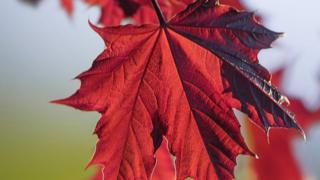
A species of maple tree offers the best protection from damaging ultraviolet rays of sunlight, a study has suggested.
The crimson king (Acer platanoides) variety of maple tree came out as the most protective, closely followed by species of oak and a beech.
Experts say trees can provide people with important protection against the harmful effects of UV radiation.
The findings appear in the Urban Forestry & Urban Greening journal.
It is the first study of its kind to be carried out in the Northern Hemisphere, say scientists.
However, not all species of the same group of trees offer the same protection.
Although, the crimson king maple was found to offer the most protection, another maple – Acer rubrum (red maple) – provided the least among the trees sampled.
- Street traders losing ‘right to shade’ under trees
- Project aims to grow a ‘city of trees’
- Calls to green ‘concrete jungle’
In the study, 64 specimens of 16 tree species were tested over two summers.
Foliage benefits
The species were chosen as they were among the most common trees that were planted in Toronto’s school playgrounds and public parks.
One of the study’s co-authors, Sivajanani Sivarajah from the University of Toronto, Canada, said that trees provided a lot of benefits, but they were poorly understood.
“We know trees are essential for air pollutant removal, storm-water reduction, and many other ecosystem services in cities,” she observed.
“However, health benefits are not easily quantifiable, like many other indirect ecosystem services. We should be thinking about trees as public health infrastructure.”
Over the course of two summers, the team measured the difference between the “erythemally” weighted UV level under a tree’s canopy and compared it with the strength of the erythemally weighted UV rays of sunlight in the open air.
Erythemal weighting gives an indiacation of the UV level’s potential to cause reddening of the skin, or sunburn.
Northern Comfort
The study is the first to report its findings in the Northern Hemisphere. Studies like this had previously only been carried out in Australia and New Zealand, Dr Sivarajah explained.
“Global climate change projections are saying we will be experiencing hotter and longer summers here.
“I believe we should be prepared for these global environmental changes and think about designing healthy, liveable cities,” she said.
“We were surprised no studies explored this phenomenon, so we wanted to provide some tree traits for choosing species to plant that can provide a higher UV protection.”
The authors, in their paper, noted: “In urban areas, solar UV radiation reflects off built structures and hard ground surfaces.
“One way to reduce effects of UV reflectance is to increase tree canopy – this is particularly important in urban areas where concrete and other hard surfaces pose heightened UV exposure risks to humans.
“In-situ measurements indicate that urban trees provide substantial protection against UV. However, few such measurements exist, and variation among tree species have been poorly characterised.”
The team found that the crimson king maple, swamp white oak, hackberry, and copper beech trees offered the highest protection factor (PF) (greater than three, meaning its shade allows you to remain outside three times longer than if you had no protection from the sunshine), while the maidenhair tree (ginkgo) and the red maple returned the lowest PF values (less than two).
Dr Sivarajah told BBC News: “What’s interesting about our work is that we found the main driving factor of variation in UV protection among trees is related to crown geometry.”
The trees with crowns that were less transparent and were wider offered greater protection. They also found that it was species with a higher level of shade tolerance that were more effective when it came to UV protection.
She concluded by saying that choosing trees offering increased UV protection was key when selecting urban tree species.
“In my opinion,” she added, “people’s health is more important than beautifying our cities, but it is possible to have both if we plan for it!”
Read MoreFeedzy


